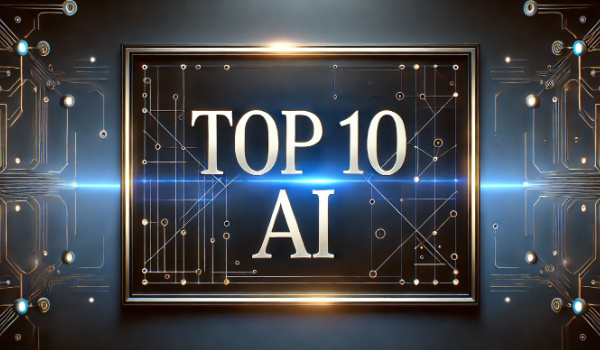Friends, the week of February 14 to February 20, 2025, brought major shifts in the world of artificial intelligence (yet again, and we suspect this will be true every week from here on out), with tech giants making bold investments, governments debating AI regulations (let’s stop debating and get to some policy), and startups facing both success and failure. As you might imagine, all the usual suspects – a/k/a the biggest players in AI – continued to drive the headlines this past week. Alibaba doubled down on AI spending, while Amazon and Meta cut costs to fund AI research. Meanwhile, DeepSeek’s influence continued to grow, prompting discussions among global business leaders. From major AI-driven layoffs (gulp) to new investments in robotics and cloud computing, this week showcased the fast-paced, high-stakes world of AI—and the ongoing battle to shape its future.
Key Highlights from the Week in AI:
-
Alibaba’s Aggressive AI Investment: Alibaba commits to substantial AI and cloud computing investments over the next three years, aiming to advance artificial general intelligence and enhance its technological infrastructure.
-
Big Tech’s Cost-Cutting for AI Funding: Companies like Amazon and Meta are implementing cost-cutting measures to reallocate resources toward AI development, balancing expense reduction with technological advancement.
-
DeepSeek’s Influence on Global AI Dynamics: DeepSeek’s cost-effective AI models prompt discussions among global CEOs, highlighting the startup’s significant impact on AI development and market strategies.
Now let’s dive into the week’s top 10 stories, full of political and international implications!
1. Alibaba Commits to Aggressive AI Investment
Alibaba has announced plans to “aggressively” invest in artificial intelligence and cloud computing over the next three years. This initiative aims to develop artificial general intelligence and enhance the company’s technological infrastructure, positioning Alibaba as a leader in the AI sector. The company reported an 8% revenue increase in the final quarter of 2024, with significant growth in its cloud and international e-commerce businesses. This strategic investment underscores Alibaba’s commitment to advancing AI capabilities and competitiveness.
2. Big Tech Implements Cost-Cutting Measures to Fund AI Initiatives
Major technology companies, including Amazon and Meta, are aggressively cutting costs to fund large investments in AI. Amazon’s retail CEO, Doug Herrington, emphasized the balancing act of reducing expenses while investing in new technologies. Despite substantial layoffs and the shutdown of unprofitable segments, Amazon continues to invest heavily in areas like AI and robotics to improve long-term efficiency and customer experience. Similarly, Meta has trimmed its workforce while boosting investment in AI talent. These efforts reflect a broader trend among tech giants to reallocate resources toward innovations like AI, despite the significant upfront costs and delayed financial returns these technologies entail.
3. DeepSeek’s AI Models Prompt Global Discussions
Chinese AI startup DeepSeek has become a focal point in recent earnings calls of major companies. Business leaders are frequently questioned about DeepSeek’s cost-effective AI models and their implications for the industry. CEOs from companies like Airbnb, ARM, AMD, Google, and Meta have acknowledged DeepSeek’s advancements, noting its potential to drive innovation and reshape AI development strategies. This trend underscores DeepSeek’s growing influence in the global AI landscape.
4. Dell Nears $5 Billion AI Server Deal with xAI
Dell Technologies is close to finalizing a deal exceeding $5 billion to supply servers optimized for artificial intelligence to Elon Musk’s AI startup, xAI. The servers will utilize Nvidia’s GB200 semiconductors, enhancing xAI’s computational capabilities. This partnership reflects the increasing demand for AI-optimized hardware and Dell’s strategic positioning in the AI infrastructure market.
5. Humane AI Startup Shuts Down After Negative Reviews
San Francisco-based AI startup Humane has announced its closure following extremely negative reviews of its wearable AI-embedded pins. Despite raising over $230 million in funding, the company failed to deliver a viable product, leading to high return rates and widespread criticism. HP Inc. has agreed to acquire Humane’s software, patents, and employees for $116 million. This development highlights the challenges and volatility within the tech startup ecosystem, especially in the competitive AI sector.
6. Meta Plans Investment in AI-Driven Humanoid Robots
Meta Platforms is establishing a new division within its Reality Labs unit to develop AI-powered humanoid robots capable of assisting with physical tasks. This initiative aligns with Meta’s broader strategy to integrate advanced AI technologies into practical applications, potentially transforming industries such as manufacturing and healthcare. The development of AI-driven humanoid robots signifies Meta’s commitment to expanding its AI research and development efforts.
7. NIST Faces Potential Layoffs Amid Budget Cuts
The National Institute of Standards and Technology (NIST) is facing potential mass layoffs due to significant budget cuts directed by the Trump administration and the Department of Government Efficiency (DOGE). These layoffs could impact up to 500 recent hires and senior technical experts, particularly within AI safety institutions. The budget reduction follows the rescinding of a previous AI Safety Executive Order, raising concerns about the future of AI research and safety standards in the U.S.
8. AI Agents Present Opportunities Amid Business Model Uncertainty
The development of “Agentic AI,” systems capable of independently performing tasks, has attracted significant investment from major corporations and startups. These AI agents promise enhanced customer experiences and operational efficiency. However, businesses face challenges in integrating these technologies effectively, and the concrete returns on investment remain uncertain. This situation highlights the need for evolving business models to accommodate AI capabilities.
9. Global IT Spending to Rise by 9% Driven by AI and Cloud Investments
Global IT spending is projected to increase by 9% in 2025, primarily driven by investments in artificial intelligence and cloud computing. This surge reflects the growing importance of AI and cloud technologies in modern business operations and the continuous digital transformation across industries. Companies are allocating more resources to integrate AI solutions and cloud infrastructure, aiming to enhance efficiency and competitiveness.
10. Paris AI Summit Reveals Global Policy Divides
The Paris AI Summit highlighted a global push for AI regulation, with many nations endorsing a statement promoting inclusive and sustainable AI. However, the U.S. and the U.K. opposed the declaration, revealing differing international perspectives on AI governance. This divide emphasizes the challenges in establishing unified global AI policies and the varying approaches nations take toward AI development and regulation.
- Opening and editing presented by a real live human on the DWN team
- Content synopsized by ChatGPT






